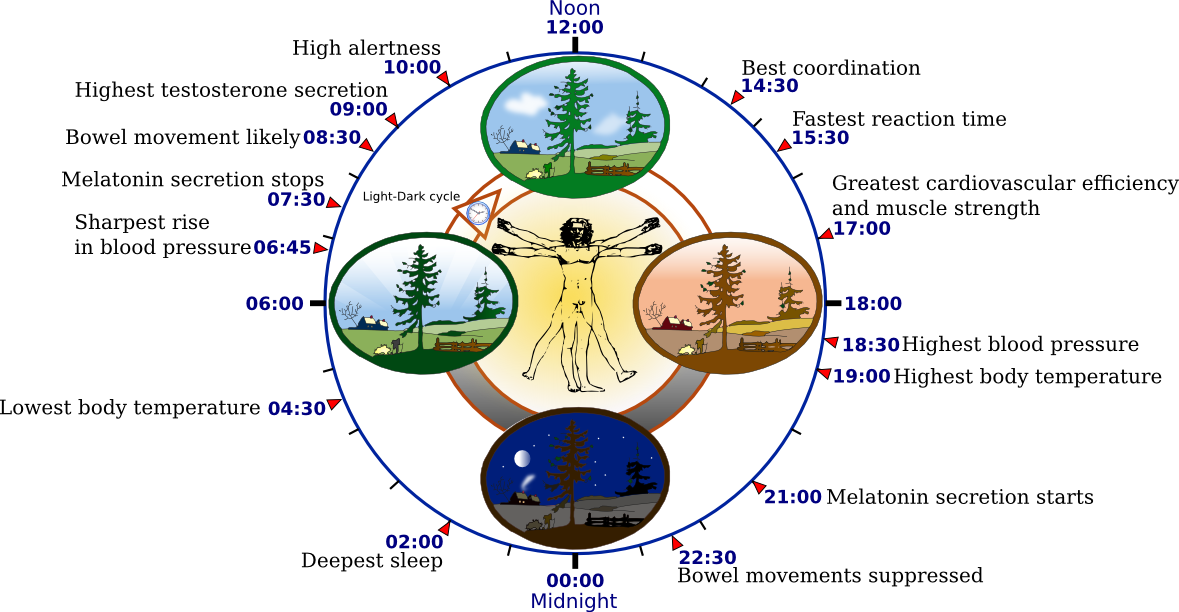
You might think that your body's metabolism reflects your state of mind, but a new study finds that the reverse is often true: Your biological clock actually opens and closes specific communication channels in your brain.
I can already hear some of you saying, "Well, obviously -- when I turned 12, I suddenly realized there were beautiful girls (or boys) everywhere, and I'd never noticed them before!" What we're talking about here is much more precise than hormonal shifts, though: Throughout every day and night, an area of your brain known as the suprachiasmatic nucleus (SCN) "listens in" on your body's chemical state and responds by actively tinkering with the sensitivity of other neural pathways.
This overturns a long-held belief about the brain: "The idea has always been that metabolism is serving brain function," says biologist Martha Gillette, who headed the study's research team. "Our study implies that changes in cellular metabolic state could be a cause, rather than a result, of neuronal activity."
Your biological clock -- also known as your circadian clock -- isn't just responsible for major changes like puberty and menopause; it runs on a 24-hour cycle, regulated by the dazzlingly complex interactions of a whole menagerie of special proteins called enzymes. These interactions are so complex, in fact, that predicting enzyme behavior remains an open mathematical problem.
It's not a problem for the enzymes themselves, though; within the cytoplasm of millions of cells throughout your body, they coordinate your daily journey from sleep to wakefulness and back again, without any overall intelligence to guide them. For example, an enzyme known as JARID1a acts as an alarm clock, triggering the biochemical processes that wake you up, and later in the day an enzyme known as HDAC1 locks down the production of wakeful enzymes, allowing your body's chemistry to shift into bedtime mode.
Biochemical shifts like these affect everything from muscle tone to digestion to alertness -- even, as this study shows, the very shapes of your thoughts.
This raises a curious idea about thoughts themselves. As any student of meditation knows, thoughts fall into two broad categories: those we consciously choose to think, and those that arise on their own, out of the mind's hidden depths. In other words, our minds seem to be forged by interactions between "bottom-up" processes and "top-down" control. We can choose to focus on a certain object or thought, but more often our attention is automatically "captured" by one idea or image after another. In fact, studies show that we unconsciously come to decisions as much as six seconds before we're consciously aware we've made them. That's bottom-up consciousness in action.
When you reflect on how small a part of your mind your conscious awareness really is, it's hard not to be struck with a sense of vertigo -- similar to the feeling of realizing how small our planet is in the cosmos, or how many atoms fit in the dot of a pencil, or how many millions of years life thrived on Earth without a single human to observe it. Our conscious minds, children of the primeval savannah, seem ill-equipped to orient themselves on scales of light-years and nanometers and geological epochs.
Yet somehow that never stops us. We're explorers by nature -- from the bottom up, as it were -- and when we reach a frontier where our bodies can't go, we send our minds. Whether the frontier is deep in space or hidden within our biochemistry, we bend our thoughts until they wrap around it -- until we understand, intuitively, what the territory's like.
